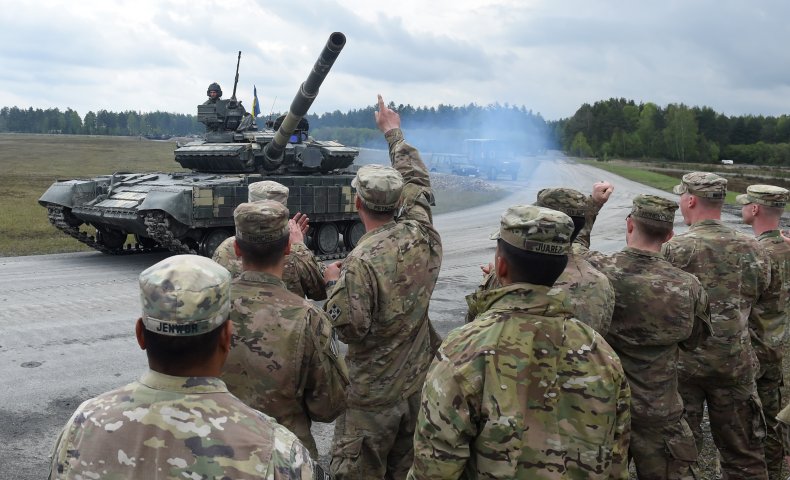BY DAVID BRENNAN ON 12/29/21
NEWSWEEK
The U.S. and its Western allies are to blame for the dire state of relations between NATO and Moscow, according to a top Russian United Nations diplomat.
First Deputy Permanent Representative to the UN Dmitry Polyansky on Wednesday accused the U.S. and NATO of "exploiting" divisions in the former Soviet Union in the 1990s, and trying to "crush" the newly emerged Russian Federation.
Russian diplomats are on a pointed public offensive against the U.S. and its NATO allies, spurred by renewed tensions along the Ukraine border where tens of thousands of Russian troops remain deployed.
The crisis has dragged on for months, with Kyiv and its Western backers calling for Russian de-escalation, but the Kremlin demanding guarantees that Ukraine will never be allowed to join NATO. Joint NATO-Russia security talks are planned for mid-January.
Russian officials have been echoing President Vladimir Putin's argument that the West, not Moscow, is to blame for geopolitical tensions. The eastward expansion of NATO after the Soviet collapse is proof, they say, of Western duplicity and a plot to surround and smother Russia.
The U.S. and its Western allies are to blame for the dire state of relations between NATO and Moscow, according to a top Russian United Nations diplomat.
First Deputy Permanent Representative to the UN Dmitry Polyansky on Wednesday accused the U.S. and NATO of "exploiting" divisions in the former Soviet Union in the 1990s, and trying to "crush" the newly emerged Russian Federation.
Russian diplomats are on a pointed public offensive against the U.S. and its NATO allies, spurred by renewed tensions along the Ukraine border where tens of thousands of Russian troops remain deployed.
The crisis has dragged on for months, with Kyiv and its Western backers calling for Russian de-escalation, but the Kremlin demanding guarantees that Ukraine will never be allowed to join NATO. Joint NATO-Russia security talks are planned for mid-January.
Russian officials have been echoing President Vladimir Putin's argument that the West, not Moscow, is to blame for geopolitical tensions. The eastward expansion of NATO after the Soviet collapse is proof, they say, of Western duplicity and a plot to surround and smother Russia.
"Everybody was thinking that people in the West are our friends, that they really are giving us a hand so that we will live in some better place, a better world and nobody will ever remember about the Cold War, about East and West," Polyansky told reporters on Wednesday, according to Russia's state-backed Tass news agency.
"But eventually things have gone [the] other way very quickly."
"We saw that the intentions of our colleagues are not as innocent as it was presented at the beginning," Polyansky said. "We saw a lot of Americans and Europeans exploiting our country, trying to split it, to crush it, to split Russia further, to promote separatism in Russia, to promote divisions between Russia and newly emerged states."
Russia's initial federal history was "very difficult, very challenging," with the country "really on the brink of collapse," the diplomat added. But as the country moved through the 2000s, he said, "we have started to be perceived as a threat by the West, by the United States...What we're having now we have is kind of a remake of the Cold War, Cold War 2.0."
Polyansky suggested there is no longer any ideological basis for conflict. The U.S., its Western allies and Russia have clashed repeatedly over human rights issues, particularly Moscow's suppression of domestic political opposition. Russia's intelligence services have repeatedly been linked to successful and failed assassinations of dissidents abroad.
"There is no communist ideology that Russia or anybody else promotes, our economic structure is very close to that of the United States, or any other Western country, but confrontation is there and the efforts to portray Russia as an enemy are also there," Polyansky said. "It of course brings to your mind some conclusions that the question was not of ideology but of geopolitical struggle, which is back to existence right now, unfortunately."
At his annual Q&A press conference last week, Putin likewise accused Western rivals of stoking conflict with Moscow. The president refused to guarantee that Russian forces would invade Ukraine again, instead demanding security guarantees from the West.
"Our actions will depend not on the negotiations, but on the unconditional security of Russia, today and in the future," Putin said, referring to the planned January talks with U.S. and NATO officials.
"We have made it absolutely clear that NATO's expansion to the east is unacceptable," Putin said. "What's not clear about it?"
"We are not the ones who are threatening someone, we are not the ones who came to the border of the U.S. or the U.K.; they came to us." Putin continued. "And now they're saying, 'We will have Ukraine as well.'"
"You should come up with guarantees, right now—immediately," Putin said, addressing the U.S. and NATO.
Putin has framed the Ukraine crisis as Russia's response to NATO aggression. Russia already borders five NATO states—Poland, Norway, Latvia, Lithuania and Estonia—posing serious security concerns for Moscow. Ukraine's addition to the alliance would be a severe strategic blow.
"They just cheated us," Putin said of NATO nations. "'Not a single inch to the east,' that's what we heard in the 1990s," the president added.
Putin's proposal to exclude Ukraine from NATO permanently has already been publicly rebuffed in Kyiv, Brussels and Washington, D.C.

U.S. soldiers welcome the crew of an Ukrainian tank during 'Strong Europe Tank Challenge 2017' in Grafenwoehr, near Eschenbach, southern Germany, on May 12, 2017. A top Russian diplomat said the U.S. and its Western allies were to blame for the dire state of relations between NATO and Moscow.
CHRISTOF STACHE/AFP VIA GETTY IMAGES
No comments:
Post a Comment